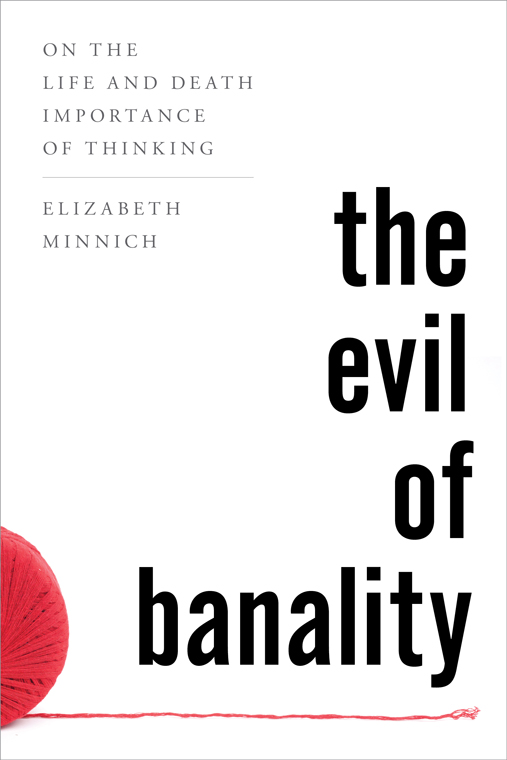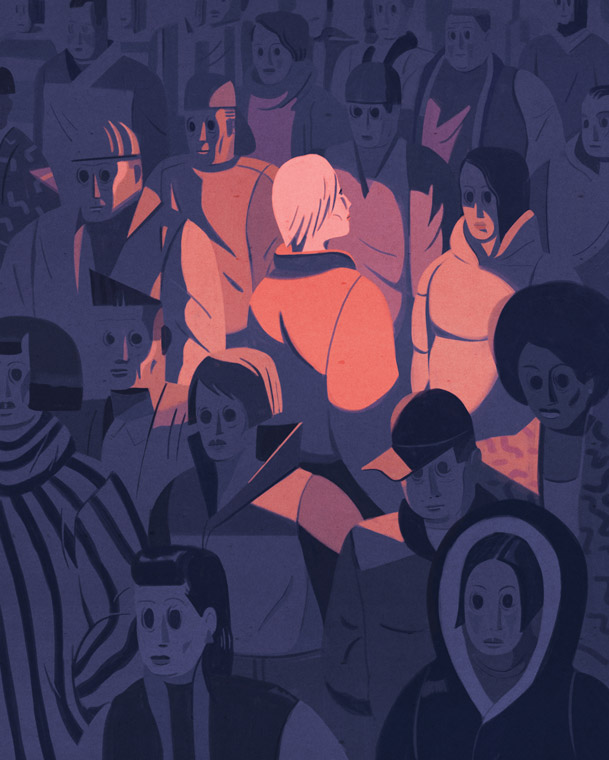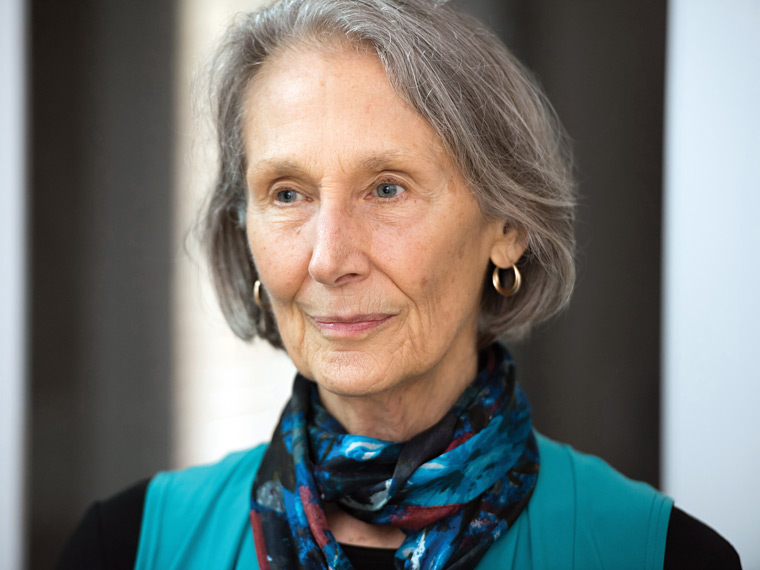A professor of moral philosophy at Queens University of Charlotte and a former teaching assistant for the influential political theorist Hannah Arendt, Elizabeth (Betsy) Kamarck Minnich ’65 has spent a lot of time thinking about thinking. Her latest book, The Evil of Banality: On the Life and Death Importance of Thinking, plays on Arendt’s famous phrase, “the banality of evil,” to explore how ordinary people can become enablers or even perpetrators of evil acts. Minnich argues convincingly that reflexive, reflective thinking—an activity she learned to engage in during her years at Sarah Lawrence—is our best bulwark against a malign complacency. As a father of two young girls and a college educator, I was moved by these entreaties toward curiosity and awareness—qualities in desperate need of cultivation amid the knee-jerk outrage of these politically polarized times.
I talked with Minnich about her new book in relation to the inaugural-year theme of democracy and education, and about the need for vigilant thought in the fight against our own species’ worst tendencies.
DH: It seems to me that your book is breaking down the idea of “thinking” into different modes. Myopic or self-directed thinking (How do I get ahead in my career? for instance) is different from observational or outwardly directed thought (What are the consequences of my actions?). How do you think we fall into the “wrong” kind of thinking, and how can we avoid doing so?
EM: Your suggestion that there are two main modes of thinking that figure in The Evil of Banality, self- and outer-directed, and/or “myopic” and concerned with consequences (I think you have at least four “kinds” there), is certainly interesting. Right now, though, I have to emphasize that reflexive turn. Thinking about what we are doing and thereby opening a reflective space that enables indeterminate judgment—this is what is of life-and-death importance about thinking. There is a longstanding temptation to think of the perpetrators of extensive evils as inexplicably monstrous, as radically other and evil as their horrific deeds. This, I am now convinced, is inaccurate. Genocide (for instance) requires many, many people doing horrific harm reliably, over time. I have become convinced that people who are not thinking are capable of anything.
DH: I fear that there are too many of us not thinking right now.
EM: What really concerns me? I fear that we will continue to be unable to work effectively against regimes going bad in time to stop them, unless we recognize that they depend on the same banal motivations and enclosures of mind—from careerism to clichéd sentimentality to conventionality, even low-grade greed, a historical patriotism, et al.—that carry us through our days without too much harm, until they don’t.
DH: That leads me into the thorny terrain of our current political moment. Here at Sarah Lawrence College, there is a pervasive belief that only a non-thinking person could support the elected regime and its agenda. It feels as if democracy is revealing some of its fault lines, because if enough “democratic voters” fail to think, the system that results will select for (and reward) more non-thinking. Is this pattern familiar to you from your learning and research? How do we resist this kind of “snowball effect”?
EM: Such an important question. Thank you. I agree that supporters are not often enough thinking in the basic sense—reflexively, reflectively. Mr. Trump, who tweets away what in others could prompt self-reflection, may be most extraordinary in this regard. He is quicker on the draw in his use of banalities that paralyze thinking than even Reagan was (and he was very good at it). But calling Mr. Trump’s supporters “deplorables” and other such lump labels is not only counterproductive but wrong, the result of a mistake that skews—or derails—analyses. It is translating not thinking reflexively, reflectively, into not thinking at all. From there it’s a slippery slope down to stupid, ignorant, and then, before long, “we” are reduced to head-shaking and expletives. I think our greatest danger is actually no one person, nor even a few: It is all of us who choose to keep our minds working in the ways that have taken care of us thus far. “I’m not a risk-taker,” said many a good German who was not deluded about the Nazis. Keeping your head down may work sometimes and giving people a chance may often be a virtue—but sometimes, the opposites are true. How can we know when? We can’t: We can only keep thinking, paying attention. Hannah Arendt tried to remind us, time and again, that politics is always particular.
“Calling Mr. Trump’s supporters ‘deplorables’ and other such lump labels is not only counterproductive but wrong, the result of a mistake that skews—or derails—analyses.”
DH: You teach and are particularly devoted to a course titled “Contemporary Moral Issues” at Queens University. How do you perceive your own role in molding morally sound, reflective citizens?
EM: I don’t think of molding them. … I try to work from the inside out rather than, as with a mold, from the outside in. … Among my interests, morally and pedagogically, are practicing freedom and being open to the unique, both of which surely resist any formations of morality. When we are on collective autopilot, we are blinded to the unique—and so to each particular person, moment, situation. We are also refusing freedom, with all its difficult choices, startling encounters, disturbingly unfamiliar experiences, freshly powerful feelings. If we explore meanings by thinking them through together, we can also practice indeterminate judgment, choice, and responsibilities together without fear or rancor, because we have come to know each other well enough to find our differences interesting and to have less fear of uncertainty, ambiguity, complexity. I can live with that as aspiration, anyway. It does seem to me a way of inviting intellectual, moral, and political aspirations into democratizing relation.
“While we may be different from one another in many ways, we actually do not differ in having a capacity to think.”
DH: Finally, what do you believe should be the goal of education in 21st-century America?
EM: From the perspective of my book, clearly it is to educate against our quite ordinary propensity to slide into enabling extensive evils. Extensive good and evil are seeded in our small virtues and vices, our interests and ways of relating daily. There will still be monsters now and then; I don’t think we can educate against that. But the rest of us, on whom the really large-scale and lasting good and evil utterly depend? While we may be different from one another in many ways, we actually do not differ in having a capacity to think.
For the 21st century, thinking really is of life-and-death importance. Every single subject studied, however theoretical, however applied and/or practical, should make of it also a focus for inquiry from differing perspectives. Or else this interconnected world of ours could give us totalitarianism of a more pervasive, perverting sort than ever before.
Written by David Hollander MFA ’97 (writing)
Illustration by Emiliano Ponzi
Photo by Stephanie Chesson
Elizabeth Kamarck Minnich ’65 is a senior scholar at the Association of American Colleges and Universities: Office of Diversity, Equity, and Global Initiatives. She wrote her doctoral dissertation on John Dewey, and has continued to explore—in her work and her teaching—the responsibilities of education in (and for) democracy. She is the author of The Fox in the Henhouse and Transforming Knowledge, which received the Frederic W. Ness Book Award for “best book in liberal learning,” and her essays have been widely anthologized. Minnich has served in many academic roles (both pedagogical and administrative), including a stint as acting director of continuing education at Sarah Lawrence College (1972–73).


